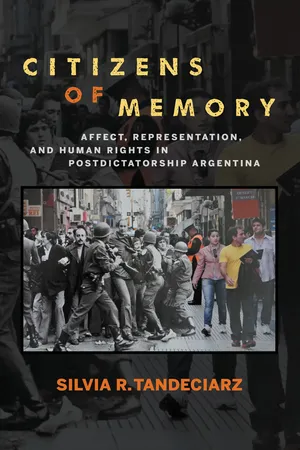
eBook - ePub
Citizens of Memory
Affect, Representation, and Human Rights in Postdictatorship Argentina
- English
- ePUB (mobile friendly)
- Available on iOS & Android
eBook - ePub
Citizens of Memory
Affect, Representation, and Human Rights in Postdictatorship Argentina
About this book
Citizens of Memory explores efforts at recollection in post-dictatorship Argentina and the hoped-for futures they set in motion. The material, visual, narrative, and pedagogical interventions it analyzes address the dark years of state repression (1976-1983) while engaging ongoing debates about how this traumatic past should be transmitted to future generations. Two theoretical principles structure the book's approach to cultural recall: the first follows from an understanding of memory as a social construct that is always as much about the past as it is of the present; the second from the observation that what distinguishes memory from history is affect. These principles guide the study of iconic sites of memory in the city of Buenos Aires; photographic essays about the missing and the dictatorship's legacies of violence; documentary films by children of the disappeared that challenge hegemonic representations of seventies' militancy; a novel of exile that moves recollection across national boundaries; and a human rights education program focused on memory. Understanding recollection as a practice that lends coherence to disparate forces, energies, and affects, the book approaches these spatial, visual, and scripted registers as impassioned narratives that catalyze a new attentiveness within those they hail. It suggests, moreover, that by inciting deep reflection and an active engagement with the legacies of state violence, interventions like these can help advance the cause of transitional justice and contribute to the development of new political subjectivities invested in the construction of less violent futures.
Frequently asked questions
Yes, you can cancel anytime from the Subscription tab in your account settings on the Perlego website. Your subscription will stay active until the end of your current billing period. Learn how to cancel your subscription.
At the moment all of our mobile-responsive ePub books are available to download via the app. Most of our PDFs are also available to download and we're working on making the final remaining ones downloadable now. Learn more here.
Perlego offers two plans: Essential and Complete
- Essential is ideal for learners and professionals who enjoy exploring a wide range of subjects. Access the Essential Library with 800,000+ trusted titles and best-sellers across business, personal growth, and the humanities. Includes unlimited reading time and Standard Read Aloud voice.
- Complete: Perfect for advanced learners and researchers needing full, unrestricted access. Unlock 1.4M+ books across hundreds of subjects, including academic and specialized titles. The Complete Plan also includes advanced features like Premium Read Aloud and Research Assistant.
We are an online textbook subscription service, where you can get access to an entire online library for less than the price of a single book per month. With over 1 million books across 1000+ topics, we’ve got you covered! Learn more here.
Look out for the read-aloud symbol on your next book to see if you can listen to it. The read-aloud tool reads text aloud for you, highlighting the text as it is being read. You can pause it, speed it up and slow it down. Learn more here.
Yes! You can use the Perlego app on both iOS or Android devices to read anytime, anywhere — even offline. Perfect for commutes or when you’re on the go.
Please note we cannot support devices running on iOS 13 and Android 7 or earlier. Learn more about using the app.
Please note we cannot support devices running on iOS 13 and Android 7 or earlier. Learn more about using the app.
Yes, you can access Citizens of Memory by Silvia R. Tandeciarz in PDF and/or ePUB format, as well as other popular books in History & Latin American & Caribbean History. We have over one million books available in our catalogue for you to explore.
Information
Table of contents
- Contents
- Acknowledgments
- A Note on Translations
- Introduction
- Abbreviations
- Chapter 1: Making Space for Recollection
- Chapter 2: Mnemonic Hauntings
- Chapter 3: Archaeologies of Identity
- Chapter 4: Purgatorio as Memoryscape
- Chapter 5: Affective Transmissions
- Bibliography
- About the Author